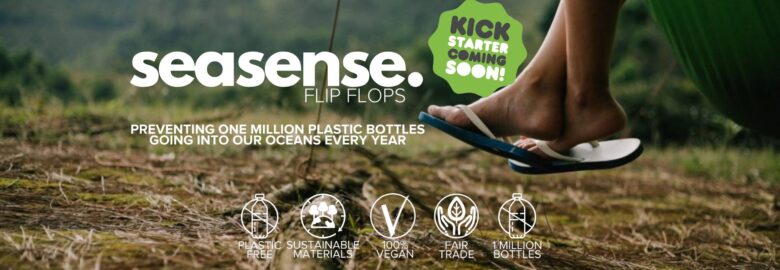Sea Sense Flip Flops
100% biodegradable flip flops
Vegan Flip Flops
Sea Sense Flip Flops are plastic-free and crafted from 100% biodegradable natural rubber. We use profits from the sale of each pair to collect 5.7kg of ocean-bound plastic, the equivalent of 500 plastic bottles, from the most polluted waterways and coastlines in the world.
A STEP IN THE RIGHT DIRECTION
Plastic is having a devastating impact on our oceans. Every day around 8 million pieces of plastic make their way into our oceans. To help make real change happen, our profit margins are kept low, so that we can use those extra funds to protect our oceans. We use the profits to fund the One Ocean Project. We share our success stories with every single person that buys a pair of our flip flops.
So what are we achieving, together?
We clean up where it’s needed most
We’re cleaning up plastic from some of the most polluted rivers and coastlines around the world.
We are making waves
Our annual target is to collect the equivalent of 1 million ocean-bound plastic bottles. That’s 20,000kg of plastic.
We are providing a vital income
We are empowering people out of poverty by helping to monetise plastic; offering incentives for collection, and helping to strengthen communities in less fortunate parts of the world.
We are making sustainability circular
Please only buy our flip flops when when you need a new pair. When you do decide your current pair have flipped their last flop, send them to us, free of charge, and we’ll recycle them. The same goes for your Sea Sense flip flops when they have reached the end of their adventure with you. We will then hand them over to our partner who will use your flip flops to safety proof children’s playgrounds. Please email us to send us your old flops.
OUR SUSTAINABILITY COMMITMENT
Sustainability is a concept related to the development of products that involves meeting our present needs without compromising the ability of future generations to fulfil their own needs. Sustainability recognises that the environment is an exhaustible resource, therefore, it is important to use the environment and its resources rationally and protect it for the good of the Earth, our environment, humanity and all living things.
While most people associate it with the environment, sustainability can be explored in various other contexts, including economic development and social responsibility. From climate change to human rights, making mindful choices when developing our products is a priority. It is important for us that we adhere to the UN Sustainable Development Goals.

FAIR WAGES AND WORKING CONDITIONS
Fast fashion brands do an excellent job keeping clothing prices low, making them popular. However, this low clothing cost is made possible by harsh working conditions for garment workers. Fast fashion brands produce their clothing in factories in the Global South where workers are paid far below a living wage. Poor safety and health conditions, long working hours, and the constant pressure to produce all create an environment of worker exploitation. Frequent child labour accusations have also been levelled against fast fashion brands.
By choosing Sea Sense, you are choosing an ethical and sustainable brand, and you can be confident that your clothing was produced under safe and fair working conditions. Our natural rubber comes from Vietnam and our manufacturing takes place in China. Our farming and manufacturing process meets the Business Social Compliance Initiative (BSCI) standard which ensures the staff are paid a fair wage and work in the most environmentally friendly way possible.
LETS TALK CARBON
The fast fashion industry leaves a large carbon footprint behind as part of its operations, including the amount of textile waste in landfills, water pollution, and other widespread negative impacts on the environment and human health. Fast fashion clothing is often made from petroleum-based materials, including acrylic, nylon, and polyester, which also require a significant amount of energy during production.
On the other hand, Sea Sense uses utilises materials made from natural fabrics from sustainable harvests. These materials require little to no chemical treatment, less energy, less water, and no pesticides or fertilisers to grow. Our materials are even biodegradable, resulting in less environmental pollution.
Transportation is another major contributor to the carbon footprints that fast fashion brands are leaving behind. From day one we were determined to eliminate the carbon footprint of our shipping, as well as every other element of production. We reduce our impact by positively offsetting the total carbon used, making Sea Sense a carbon positive business.
.webp)
Transparency is really important to us, so we want to have our numbers on display for everyone to to see. We believe that this should be standard practice for all companies, because when you know your exact carbon footprint, you can then work towards offsetting it and driving it down to zero, reducing your impact on the planet.
We measure our carbon footprint by the kg of CO2e emitted to create our products. CO2e is a metric measure that is used to compare emissions from various greenhouse gases on the basis of their Global Warming Potential (GWP) by converting amounts of other gases to the equivalent amount of CO2. By using this calculation, we can add up all greenhouse gases and convert them to CO2 when measuring the environmental impact of our products. This means we are also keeping tabs on things like methane emissions, a greenhouse gas even more potent than carbon dioxide.
PUTTING IT INTO PERSPECTIVE

We are very proud that the average footprint of our products is only 7.7 kg CO2e, but, what exactly does that mean? Is it good? We don’t want to bombard you with statistics and numbers in the hope of sounding more environmentally friendly than we are; we want to be up front and give you the chance to decide whether or not you should add our products to your annual carbon footprint. If we look at everyday examples, you can see how little 7.7 kg CO2e really is…
BEYOND OFFSETTING
We go above and beyond just carbon offsetting. We invest in the nature-based solutions that are going to pack the biggest punch when addressing the climate crisis. We don’t just balance our impact – we are climate positive. The programmes we invest in offset more carbon than we are producing, over their growth life.
In an effort to be Climate Positive, we support the Mai Ndombe REDD+ Project which is based in the Democratic Republic of Congo. This project is not only about protecting the world’s second-largest intact rainforest but also about helping local communities through education and providing vital medical care. This REDD+ project is found in the heart of DRC in the Congo basin, the second most important rainforest in the world after the Amazon.
This project was launched in 2011 and is run by Wildlife Works. It is pushing the boundaries of what a REDD+ project can achieve, and is a world-class example. It not only reduces forest and biodiversity loss but is providing community prosperity through vital investments into the local area. It has protected 300,000 hectares of vital Bonobo and Forest elephant habitat as well as some of the most important wetlands in the world.


